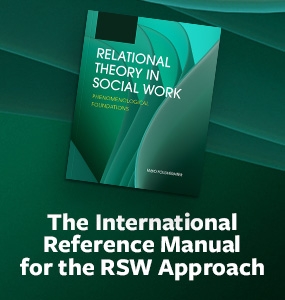Editorial
Fabio Folgheraiter
Università Cattolica del Sacro Cuore, Milan, Italy
Dear readers,
I am pleased to present the new issue of «Relational Social Work», with interesting articles on important Social work topics.
The issue opens with an inspiring article on a qualitative study conducted in Italy by Koenig and colleagues on the migratory journeys of African refugees and the challenging and violent experiences they have had along the way. The paper provides an in-depth examination of the narratives of African refugees who made the dangerous journey from their homes in Africa to Italy, highlighting how the dramatic and oppressive experiences can stimulate process of self-reflection, personal growth and critical consciousness. The study demonstrates the importance of recognising and valuing the refugees’ experiential knowledge: not only can social workers learn from refugees’ resilience to better support them, but people with migrant backgrounds can also support newly arrived refugees, working alongside social workers.
The second paper focuses on how human connections between groups develop over time. Frank and colleagues from Pennsylvania (USA) carried out a qualitative study used letter writing and analysed over 600 pages of letters exchanged between pairs of Social work students and community members engaged with anti-poverty organizations. This innovative study highlights how letter writings is revealed a useful research tool to explore and examine the development of human connection within groups, but also an effective intervention to address loneliness in communities.
The issue continues with another research article focusing on the complexities of working with young people from a migrant background who use social and educational services. Lannutti from Italy presents the main findings of a qualitative study involving social service managers, psychologists and social workers employed in Italian welfare organisations. Data collected through 18 semi-structured interviews show that social workers feel able to address the social problems of the young people they work with, despite the cuts in resources that have characterised the sector in recent years. Valuing relationships with service users and promoting networking and collaboration with other social services are seen as ways of overcoming difficulties.
Mavuka and Kumbirai draw our attention to social workers’ perceptions of digitalisation within child welfare programmes in a selected agency in Zimbabwe. The authors present findings from a qualitative study based on in-depth interviews with social workers employed in child welfare programmes. The study shows that digitalisation poses several ethical dilemmas for social workers. Based on the literature and data collected, the article offers several recommendations to improve the work of social workers in the digital space, which may include reviewing ethics at the local level, having a digitalisation blueprint for social workers, creating a platform for professionals to share digitalisation experiences, and providing digitalisation appropriate social work education in higher education institutions.
As usual, the second part of the journal is dedicated to Voices from practice, shorter contributions related to Social Work practices inspired by the principles of the Relational Social Work method. In this issue, Parolari from Italy presents a practical experience of involving a group of people experiencing poverty in a social policy planning process at local level. This innovative practice was documented through an action research aimed at exploring how to facilitate the participation of service users, as experts by experience, in the planning of social policies against poverty. The description and analysis of this experimental experience is based on the principles of Relational social work.
I would like to thank all the authors for their interesting and stimulating contributions and for their commitment to improving the study and reflection of Relational Social Work.
Milan, October 2024




